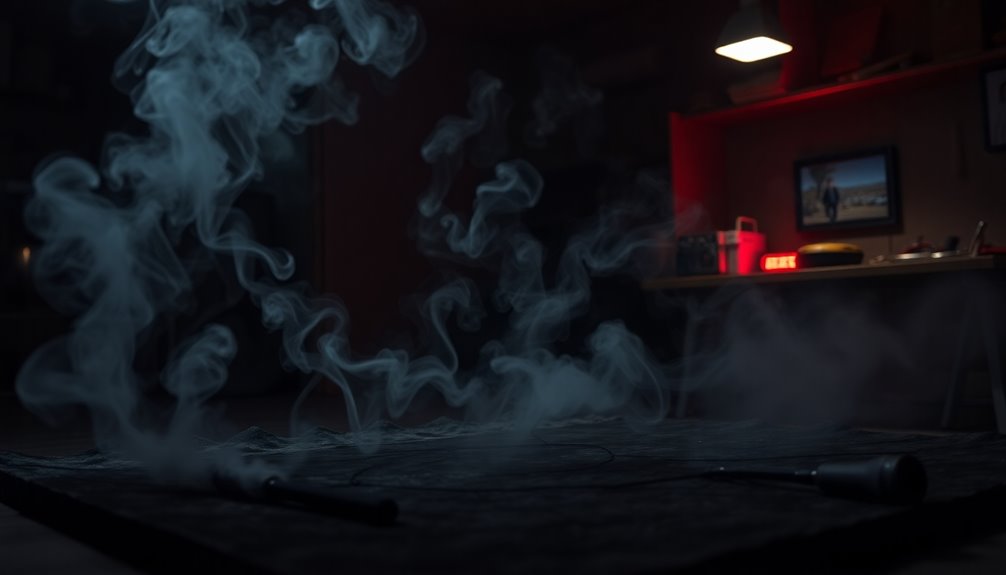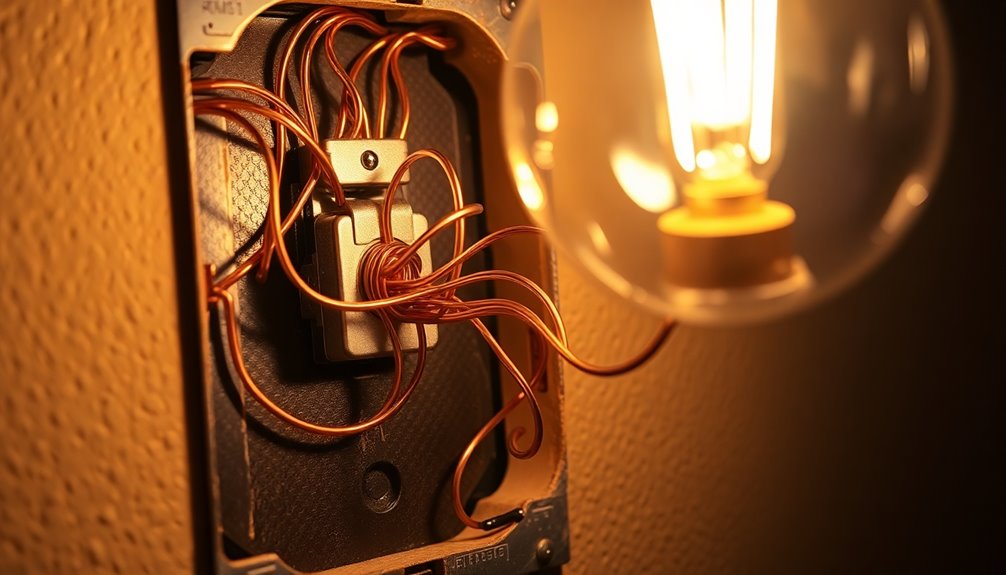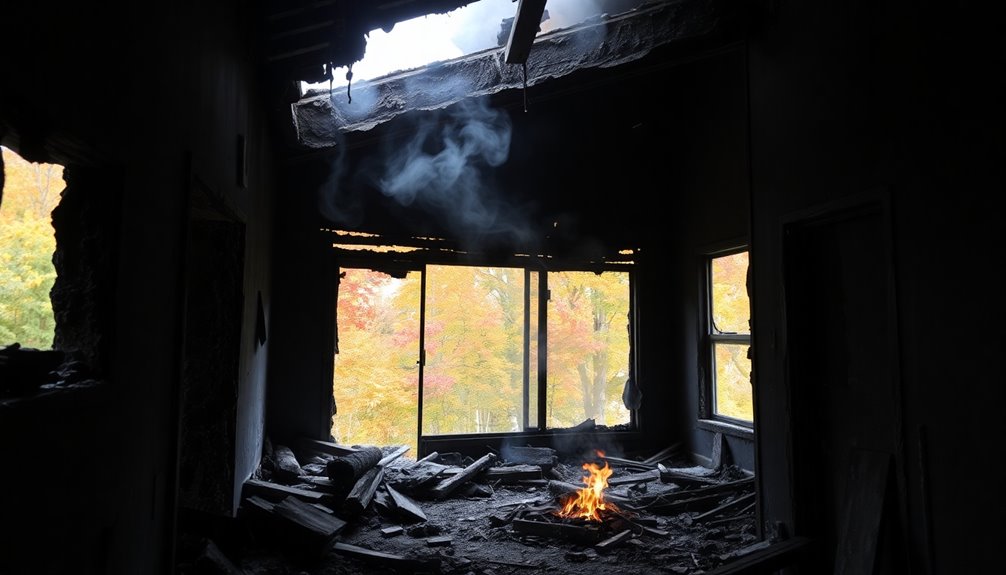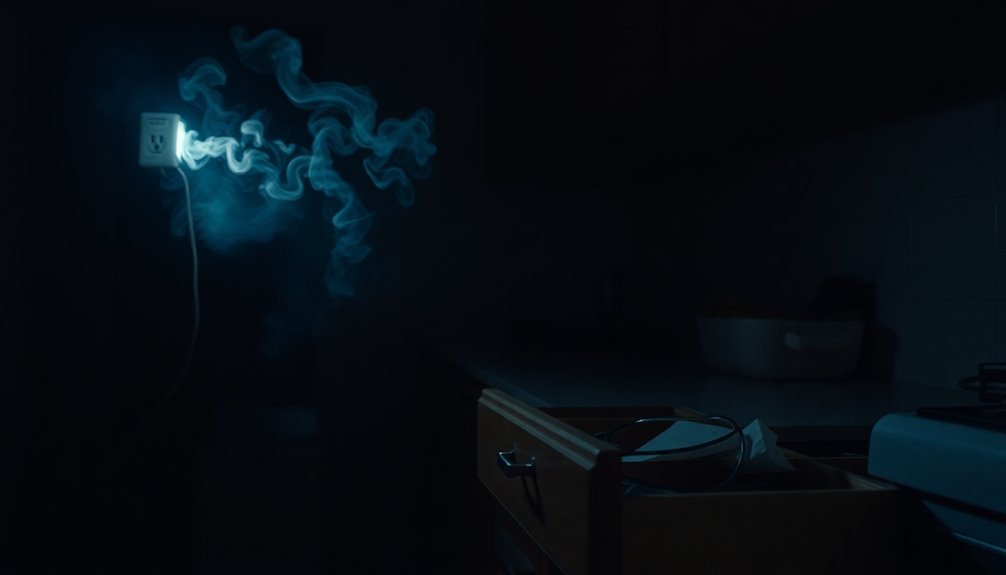If you smell burning rubber in your house, it's a significant warning sign that you can't ignore. This odor may come from overheating electrical components, malfunctioning appliances, or even rubber belts contacting hot surfaces. Your safety is at risk, so turn off any suspected devices immediately and ventilate the area. If the smell persists, evacuate and contact a qualified technician for inspection. Prolonged exposure can lead to serious health issues and increase the risk of a fire. Understanding the causes and taking the right steps can help protect your home and family, and there's more important info you should know.
Key Takeaways
- A burning rubber smell often indicates overheating electrical components or mechanical issues that require immediate attention.
- Turn off suspected appliances and evacuate if the smell persists to ensure safety.
- Prolonged exposure can irritate lungs and pose serious health risks, including respiratory issues.
- Contact a professional technician if the smell continues, or if you notice signs like excessive heat or flickering lights.
- Implement regular inspections and maintenance of electrical systems to prevent overheating and potential fire hazards.
Understanding the Burning Rubber Smell
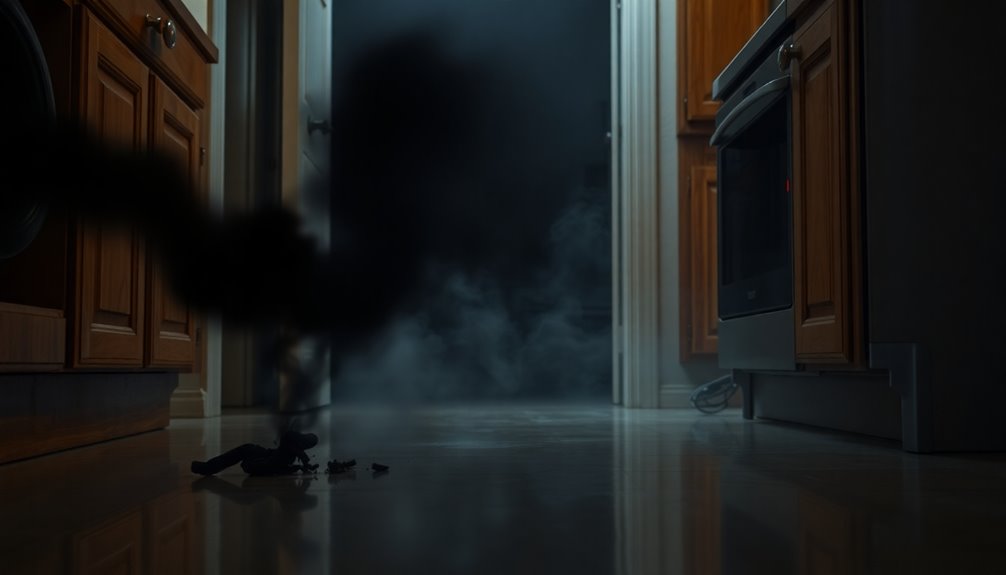
The unmistakable odor of burning rubber in your home can be alarming, and it often signals a serious issue that needs immediate attention. This smell typically arises from overheating electrical components, like wires or appliances, which pose a significant fire hazard if you ignore them.
When electrical systems overheat, they can cause damage that leads to dangerous situations, including electrical fires.
Additionally, mechanical issues can generate a burning rubber scent. A malfunctioning motor or a slipping belt creates excessive friction and heat, contributing to that unmistakable odor.
It's vital to recognize that prolonged exposure to this smell can indicate serious problems that require immediate inspection from a qualified technician.
You should also consider that household items, such as rubber mats or flooring, may be subjected to high temperatures, leading to degradation or burning.
Ignoring the scent of burning rubber can result in severe consequences, so prompt action and thorough investigation are essential for safety.
Always prioritize your well-being and act quickly to address any signs of potential danger, ensuring your home remains a safe environment.
Common Causes of Burning Rubber Odor
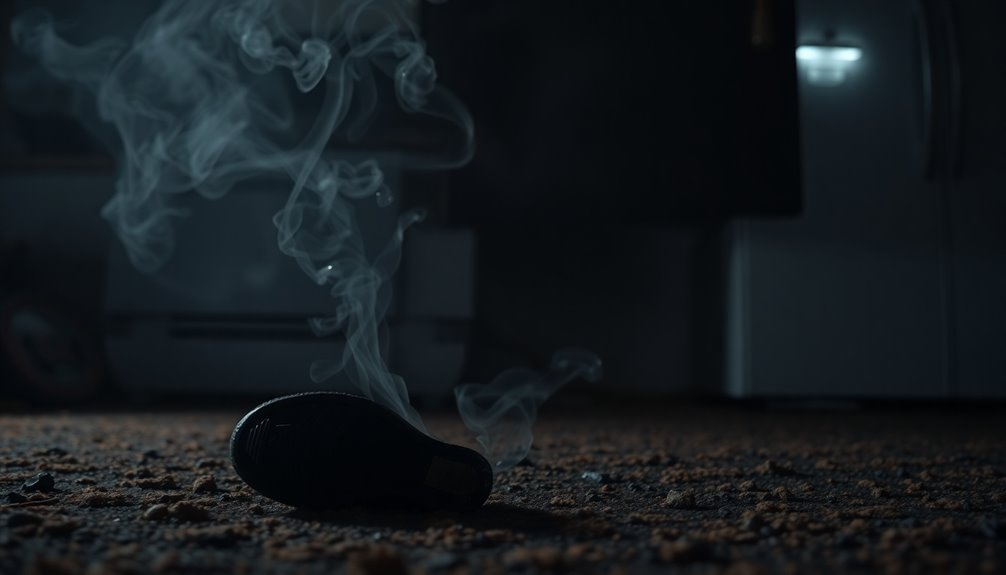
Several common culprits can cause that unsettling smell of burning rubber in your home. One major offender is overheating electrical components, such as frayed wires or malfunctioning appliances. These issues pose significant fire hazards, so you can't afford to ignore them.
Additionally, if you're working in a garage or workshop, rubber tires, belts, or other materials might come into contact with hot surfaces or experience excessive friction, leading to that familiar burning rubber scent.
If the odor persists, it might signal a failing HVAC system. In this case, rubber seals or gaskets could be overheating and releasing fumes, indicating a need for immediate attention.
Furthermore, overheated motors in electrical devices like fans or power tools can also produce a burning rubber smell. This usually means these devices require inspection and possible repair.
Immediate Actions to Take
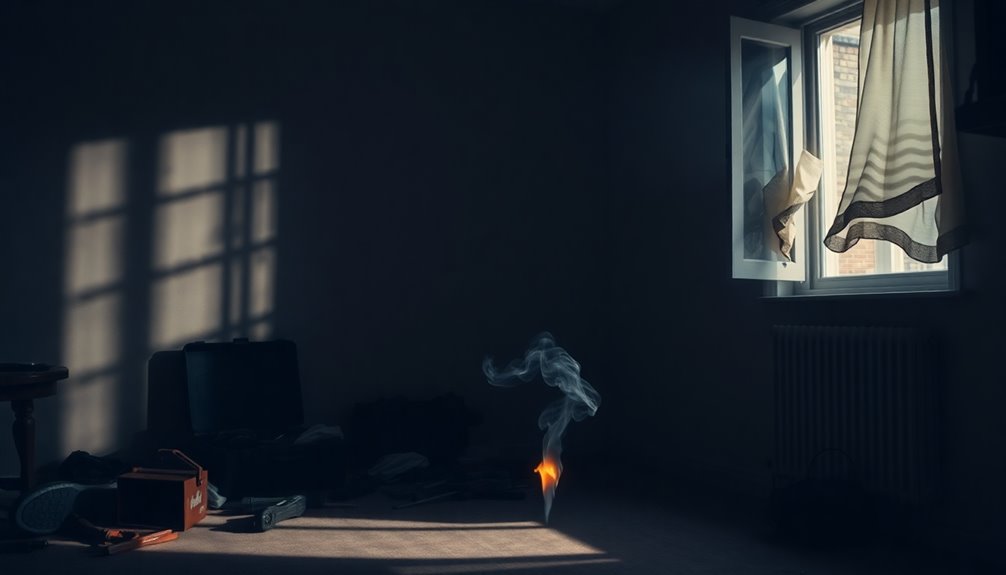
Detecting a burning rubber smell in your home can trigger immediate concern, and taking swift action is vital.
First, you should immediately turn off any appliances or devices that might be causing the odor. This helps prevent further overheating or damage. If the smell persists or intensifies, don't hesitate to evacuate the premises, as it could indicate a serious electrical issue or fire hazard.
Next, inspect areas where rubber materials are present. Look for signs of wear, damage, or overheating in:
- Appliances in your kitchen
- Electrical wiring in your walls
- Belts in your HVAC system
- Rubber seals around windows and doors
- Garage tools and equipment
Once you've assessed your safety, it's important to call a professional. Contact a qualified electrician or HVAC technician to evaluate the situation and address any underlying issues.
Finally, verify you have a functional smoke detector and fire extinguisher readily available at home. This preparedness can make all the difference in an emergency.
Stay vigilant and prioritize your and your family's safety!
When to Call a Professional
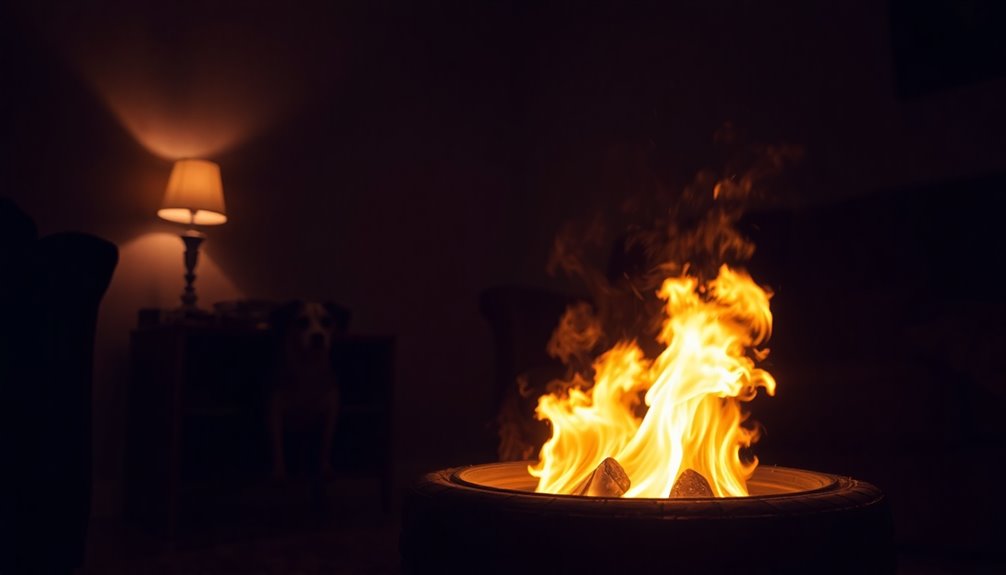
If you notice signs of overheating appliances or a persistent burning rubber smell, it's time to call a professional.
Ignoring these issues can lead to serious electrical system concerns and potential fire hazards.
Don't wait—getting expert help guarantees your home remains safe and functional.
Signs of Overheating Appliances
How can you tell when an appliance is overheating and needs professional attention? If you notice a burning smell, like rubber or plastic, it's crucial to take action. Overheating appliances can pose serious fire risks, so don't ignore these signs:
- A device that feels excessively hot to the touch
- Unusual sounds, like buzzing or crackling, coming from the appliance
- Flickering lights or frequent tripping of circuit breakers
- Smoke or visible scorch marks around the appliance or outlet
- An appliance that suddenly stops working or malfunctions
When you detect any of these signs, unplug the appliance immediately and stop using it. Ignoring these warning signals can lead to dangerous situations.
It's crucial to have any overheating appliances inspected by a qualified technician to prevent potential hazards. Regular maintenance and inspections of your appliances and electrical wiring can help you avoid overheating issues before they become critical. Additionally, be aware that certain environmental factors can increase the risk of appliance failure, similar to how exposure to jet fuel is linked to hearing impairment in veterans.
Prioritize safety in your home and address any concerns as soon as they arise. Remember, when in doubt, always call a professional!
Persistent Odor Issues
Persistent odors in your home, especially those that resemble burning rubber, signal serious issues that shouldn't be overlooked. If you notice this smell lingering for more than a few minutes, it's essential to take immediate action. A persistent burning rubber odor could indicate overheating appliances or electrical wiring problems, both of which can pose significant fire hazards.
Don't wait for the smell to disappear on its own. If the burning rubber scent is accompanied by unusual noises or changes in system performance, reach out to an HVAC technician right away. These symptoms often point to underlying mechanical failures that need expert attention.
Regular maintenance checks can help identify potential issues before they escalate, but once you detect a persistent odor, it's time for a professional inspection.
If the smell is detected near electrical outlets, appliances, or HVAC systems, evacuate the area and contact a professional for immediate evaluation. It's better to be safe than sorry. Ignoring these warning signs could lead to costly repairs or even dangerous situations.
Prioritize your safety and make sure your home remains a secure environment.
Electrical System Concerns
Electrical safety is paramount in any home, and recognizing the signs of potential issues can save lives. If you notice a burning rubber smell, it might indicate overheating electrical wiring or components. This could lead to a serious problem if left unchecked. If the odor persists after unplugging devices, don't hesitate—call a licensed electrician immediately.
Keep an eye out for these warning signs:
- A strange burning plastic smell wafting through your rooms
- Flickering lights that seem to have a mind of their own
- Frequent tripped circuit breakers or blown fuses
- Warm or discolored outlets that look unusual
- Visible damage to electrical wiring, such as fraying or melting
Ignoring these smells and signs can have dire consequences, including devastating electrical fires. It's also important to remember that regular inspections of your electrical system can help prevent issues and guarantee that your home remains safe, as emphasized in legal and professional considerations.
Regular inspections of your electrical system can help prevent issues and guarantee that your home remains safe. When in doubt, it's always better to err on the side of caution. Prioritize your safety and consult a professional if you suspect any electrical concerns.
Preventive Measures for Your Home
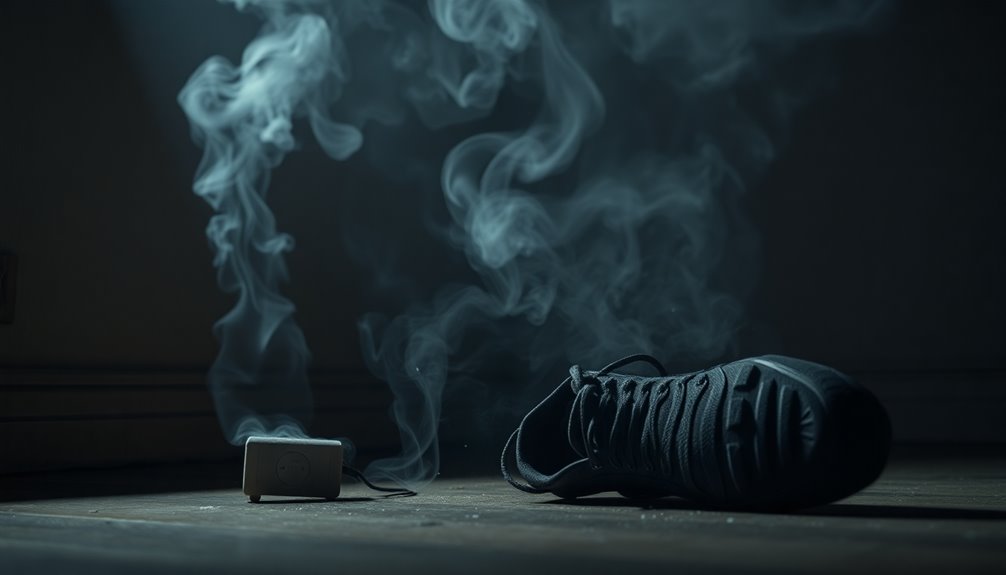
A proactive approach to home safety can markedly reduce the risk of unpleasant burning rubber smells. Start by regularly inspecting and maintaining your electrical appliances and wiring to prevent overheating. Clutter around heating elements can lead to materials melting, so keep those spaces clear. Proper ventilation is essential; make certain areas where appliances are used allow for airflow to avoid overheating and harmful fume buildup.
Scheduling annual HVAC inspections is another important preventive measure to catch potential issues before they escalate. High-quality extension cords can also make a difference; avoid overloading outlets to reduce the risk of damaged wiring and overheating.
Here's a quick reference table to help you remember these essential tips:
| Preventive Measure | Reason | Action to Take |
|---|---|---|
| Inspect Appliances | Avoid overheating | Check regularly for wear and tear |
| Clear Clutter | Prevent melting materials | Keep areas around appliances clear |
| Make Certain Ventilation | Reduce fume buildup | Open windows or use fans |
| Schedule HVAC Inspection | Identify underlying issues | Book an annual check-up |
Taking these steps can lead to a safer, more comfortable home environment. Don't ignore the signs!
Health Risks Associated With Rubber Smells
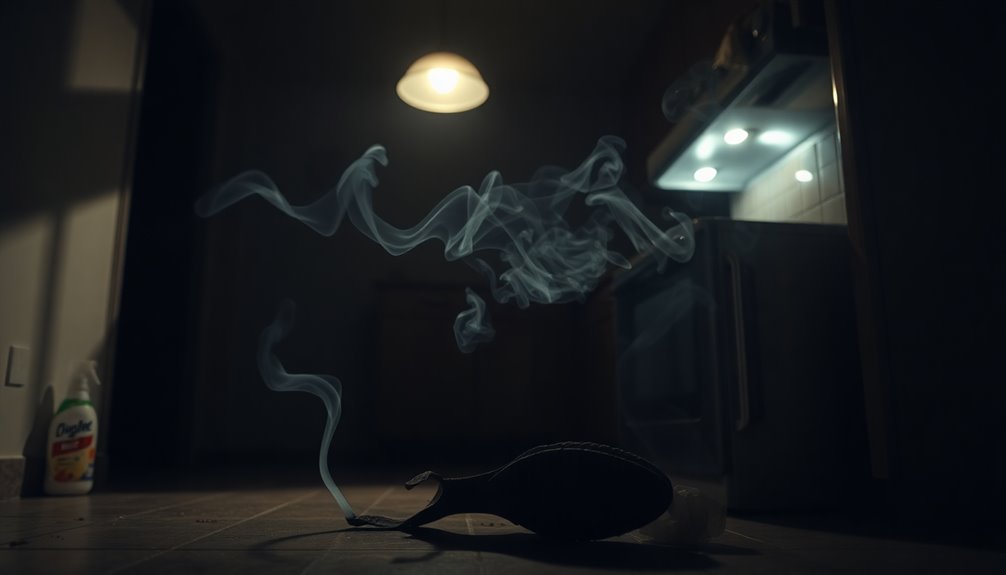
When you smell burning rubber, it's vital to be aware of the potential respiratory health concerns it brings.
The fumes can irritate your lungs and worsen conditions like asthma, making it essential to seek fresh air immediately.
Additionally, overheating rubber can pose fire hazards, so staying vigilant is key to protecting your home and health.
Respiratory Health Concerns
Exposure to the smell of burning rubber can pose serious respiratory health risks, especially for those with pre-existing conditions. Prolonged inhalation of burning rubber smells releases harmful volatile organic compounds (VOCs) that can lead to significant respiratory issues, such as asthma and chronic bronchitis.
You might experience:
- A persistent cough that won't go away
- Wheezing that makes it hard to breathe
- Shortness of breath, even in casual activities
- Irritation in your throat and nose
- An increased risk of lung infections
These fumes can irritate your respiratory tract, causing symptoms that can escalate quickly. Additionally, studies have linked exposure to harmful chemicals like benzene and formaldehyde from burning rubber to serious health problems, including lung cancer.
If you have asthma or allergies, be extra cautious; the fumes can worsen your symptoms and make you more susceptible to infections.
It's essential to ventilate affected areas immediately and seek professional help if the burning rubber smell persists. Protecting your respiratory health should always be a priority. Ignoring these warning signs could lead to serious consequences.
Potential Fire Hazards
The acrid scent of burning rubber in your home can signal dangerous overheating electrical components, a common precursor to residential fires. Ignoring this smell can greatly increase your fire risk, as malfunctioning appliances often produce these odors.
When electrical wiring or insulation overheats, it can lead to ignition sources, putting your safety at serious risk.
Prolonged exposure to burning rubber fumes isn't just a fire hazard; it poses health risks too. Inhaling the toxic fumes can irritate your eyes, nose, and throat, and may lead to long-term complications.
The fumes from burning rubber often contain volatile organic compounds (VOCs), which can have harmful effects on your respiratory system and overall health.
If you notice the smell of burning rubber, don't wait for it to dissipate. Take immediate action to identify the source, whether it's an appliance or an electrical issue.
Contact a qualified electrician to inspect your home and address any potential hazards. Remember, prioritizing your safety means recognizing the importance of that burning rubber smell and acting quickly to prevent a potentially devastating fire.
Long-Term Solutions for Safety
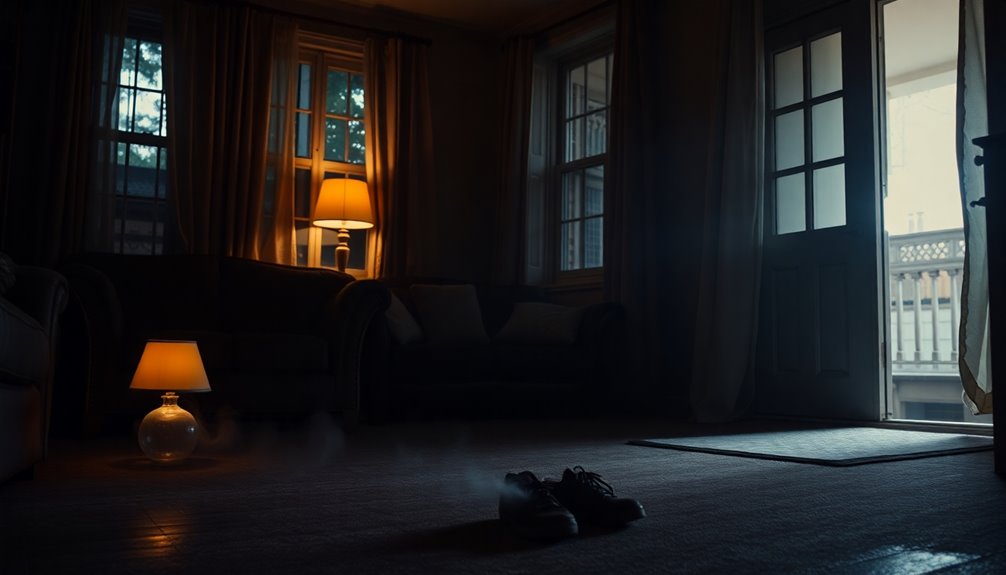
- Install smoke detectors and carbon monoxide alarms throughout your home.
- Keep a fire extinguisher easily accessible, especially near electrical appliances.
- Educate all household members on recognizing unusual smells and the importance of safety protocols.
- Develop a routine for decluttering around electrical devices to minimize fire risks.
- Schedule regular inspections of HVAC systems to ascertain they're functioning correctly.
Additionally, consider enhancing your home's safety with a home security system, which can provide peace of mind and deter potential hazards.
Frequently Asked Questions
What Does It Mean When Your House Smells Like Burnt Rubber?
When your house smells like burnt rubber, it usually means something's overheating or malfunctioning.
You might've electrical components getting too hot or worn-out belts in appliances like your dryer. Ignoring this smell can lead to severe damage or even a fire hazard.
It's essential to turn off any suspected devices and check for signs of damage, like frayed wires.
If you can't find the source, don't hesitate to call a professional for help.
Do You Smell Burning Before a Stroke?
Imagine your senses as a finely tuned orchestra; when one instrument plays out of sync, it can signal trouble.
You might wonder if you smell burning before a stroke. While there's no solid evidence linking burning smells directly to strokes, unusual odors can indicate neurological changes.
If you suddenly notice strange scents or other symptoms, don't hesitate. Get a medical evaluation to confirm everything's in harmony with your health.
What Is Smelling Burnt Rubber a Sign Of?
If you smell burnt rubber, it often signals overheating electrical components or faulty appliances.
This odor might come from melting rubber insulation on wiring or mechanical parts, like belts or motors, wearing out.
It's vital you don't ignore this smell, as it can indicate serious issues that could lead to electrical problems or even fires.
Investigate the source quickly, and if you can't find it, call a qualified electrician for help.
What Smell Indicates an Electrical Fire?
When it comes to electrical fires, you can't afford to ignore any red flags.
A distinct smell of burnt plastic or rubber often signals trouble in your home's wiring or devices. If you catch a whiff of this odor, it's time to take action.
You should immediately unplug affected appliances and shut off the circuits. Don't hesitate; get a licensed electrician to inspect the issue before it turns into a bigger problem.
Conclusion
In your home, the smell of burning rubber can be a warning bell, signaling something's amiss beneath the surface. Just as smoke alerts you to a fire, this odor demands your immediate attention. Don't ignore it—trust your instincts and take action. By addressing the issue early, you can safeguard your sanctuary, transforming potential chaos into calm. Remember, your home should be a haven, not a source of alarm. Stay vigilant, and keep your space safe and inviting.
